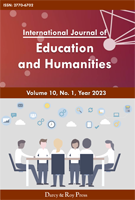A Comparative Study of the English Translation Versions of Yu Meiren from the Perspective of the Skopos Theory
DOI:
https://doi.org/10.54097/ijeh.v9i3.10508Keywords:
English Translations of Yu Meiren, The Skopos Theory, Poetry translation, Translation strategy, Comparative study.Abstract
Yu Meiren is a wonderful work of classical Chinese poetry because of the poet’s inexhaustible sadness for the destruction of his country, which is just like a torrent of water. Due to the unique cultural symbols, Chinese poetry has also been given much attention in the study of foreign translations of Chinese culture. With the frequent cultural exchanges between China and other foreign countries, translators for Chinese poetry translation are also becoming more than before. However, the translation of the same poem may have different characteristics because of the different translation views and purposes of translators. Under the guidance of the Skopos Theory, this paper will analyze different versions of translations of Yu Meiren and discuss the translation strategies that should be adopted in the translation of Chinese poems. Thus, the translation of Chinese poetry will be more in line with the reading habits of the target readers and promote the foreign dissemination of China’s excellent traditional culture.
Downloads
References
J. S. Wang: The Complete Ci-poems of Li Qingzhao: A New English Translation (Sino-platonic Papers, 1989), No.13, p.12-30.
H. M. Liu. From Xitu to Danbang -- In Memory of Professor Frankel (Reading, 2004), No.9, p.49-55.
Hans H. Frankel: The Flowering Plum and the Palace Lady: Interpretations of Chinese Poetry (New Haven: Yale University Press, 1976).
B. Wang (Translated by): The Flowering Plum and the Palace Lady: Interpretations of Chinese Poetry (Beijing: Life Reading Xinzhi Sanlian Bookstore, 2010.4).
Z. H. Zhou: Study on Sinologist Frankel’s English Translation Method of Chinese Poems (Literatures in Chinese, 2021), No.2, p.99-106.
Y. C. Xu: The Art of Translation (Beijing: China Intercontinental Press, 2006).
Y. C. Xu: On the English Translation of Poetry (Chinese Translators Journal), Vol.42 (2021) No.2, p.102-108.
Z. J. Wang: Yang Hsien Yi -- A Famous Cultural Scholar Well-known at Home and Abroad (Historical Monthly, 2009), No.8, p.18-19.
Y. Shen: A Study on Domestication and Foreignization in English Translation of Li Bai’s Poems from the Perspective of the Skopos Theory (Master, Shaanxi: Xi’an Polytechnic University, 2017).
X. Zhang: Overview of the Skopos Theory (Overseas English (Part 2), 2019), No.2, p.65-66.
C. Nord: Translation as a Purposeful Activity: Functionalist Approaches Explained (Shanghai: Shanghai Foreign Language Education Press, 2001).
K. Reiss, H. J. Vermeer: Towards a General Theory of Translational Action: The Skopos Theory Explained (London: Routledge, 2014).
D. F. Li: Introducing Translation Studies: Theories and Applications, 3rd edition. (Beijing: Foreign Language Teaching and Research Press, 2014, 06).
Z. L. Chen: The Translation of Li Bai’s Poems from the Perspective of the Skopos Theory (English Square, 2021), No.20, p.13-17.


















